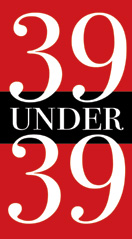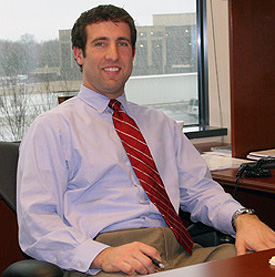Knott Applies Wabash Lessons to Business World
by Kim Johnson May 2, 2008
Jake Knott ’03, former captain of the Wabash College football team and letterman on the baseball team, is no stranger to coaching. Even as a financial advisor with Merrill Lynch in Indianapolis he defines himself as a coach. Although rather than coaching with a ball and bat, he sees his coaching role as being about emotional coaching as well as financial coaching. "Over the years in this business, I’ve definitely learned about helping manage people’s emotions and keeping them from making a bad or drastic emotional decision," Knott said. "That is just as much a part of this job as knowing how to invest their money. Some people can handle changing market conditions, some people can’t." Knott strives to quickly gauge a client’s risk tolerance and help him or her set realistic expectations. "When years are positive people are always wondering ‘why couldn’t we earn more?’ but those are the same people who now can’t understand why they’ve lost any money. In order to be able to grow, you have to be able to put a little bit at risk."
"It’s not only because of the academic rigor, there are other rigors, but you just get this feeling you can handle anything once you go through Wabash," Knott said. "I was fortunate enough to be in athletics that were both very important to the College and the other people involved. It just reinforces that no matter what comes your way or what you want to do you can do it." Part of what Knott appreciates most about his Wabash education relates to the "think critically" piece of the College’s mission statement. "Going through Wabash – I just sort of thought it was standard issue – but come to find out it’s not always like that at other places." He understands the impact it has on his current career. "Now that I’m in this business, I appreciate the fours years of having to have an opinion and be able to defend it. When clients ask ‘what do you think about the markets right now?’ They don’t want to hear ‘I don’t know, I’m not real sure.’ They want me to have an opinion and I better be right more than the weatherman." Now that Knott has gotten over the "hump" with Merrill Lynch he enjoys the freedom his career as a financial advisor affords him. "The first two years weren’t easy – we had certain goals. Being Merrill Lynch, ours are some of the toughest in the industry to meet. It’s a little like a weed-out course." He knows though his destiny is in his own hands. The work he puts in impacts what he gets out of it. "If I don’t want to get on the phone and call that next person, I don’t have to, but that also directly leads to my bottom line. When it’s 1:00 p.m. Thursday afternoon, 80 degrees out, and guys are playing golf, I can go play golf but that’s not going to bring any more business in the door. "That’s what gets me out of bed – knowing that it’s up to me. I don’t have to worry about ‘the boss didn’t give me a promotion, the boss doesn’t like me.’ All that matters is what I want to do." With freedom comes responsibility. Beyond the goals Merrill Lynch has set for him in the past, he has set goals for himself in order to achieve a desired level of financial security for he and his wife Darcy. In the business world Knott understands he only has to answer to himself but he keeps his eyes set to standards his father David Knott ’69 instilled in him while growing up. "The only rule my dad ever gave us growing up was ‘do what’s right’ because it will generally take care of everything." Knott recognizes in addition to the values he learned at home and the high caliber education he received at Wabash there is something else that contributed to his current success – the alumni connection. After talking with an alumnus in the field, he was given contact information for individuals at Merrill Lynch, and within days he was connected with someone from the company. He describes the alumni connection as the "firefighter mentality." "Here we are in this tiny, all-male bubble – you end up developing these bonds with each other because it’s a unique experience," one that few others have shared – only other Wabash students and alumni. Knott feels too few students understand the strength of the alumni network and truly take advantage of all it has to offer. "When alumni are on campus, they want to talk to you, learn about you and find out how they might be able to help you on your path because they genuinely want to see you succeed. "I saw fraternity brothers who when successful alumni were around they were never here. I always thought that’s when you want to be hanging around – when all the big, rich guys driving Mercedes are hanging out." He hopes he can return the favor and one day be able to assist a Wabash student seeking a career in financial advising. So what would he say as an alumnus to a student interested in a similar career path? "It’s going to be tough, especially early. It’s also very rewarding. If you can get through it, it’s definitely worth it. "Which is the same thing they say about Wabash." |

|

 The two-sport athlete has never shied away from hard work and risk in academics and athletics. Even though he tried his luck as a professional football player, he knew his athletic career would eventually end, so he chose to attend Wabash. He was impressed with the academic rigor and knew his education would serve him well.
The two-sport athlete has never shied away from hard work and risk in academics and athletics. Even though he tried his luck as a professional football player, he knew his athletic career would eventually end, so he chose to attend Wabash. He was impressed with the academic rigor and knew his education would serve him well. 




























